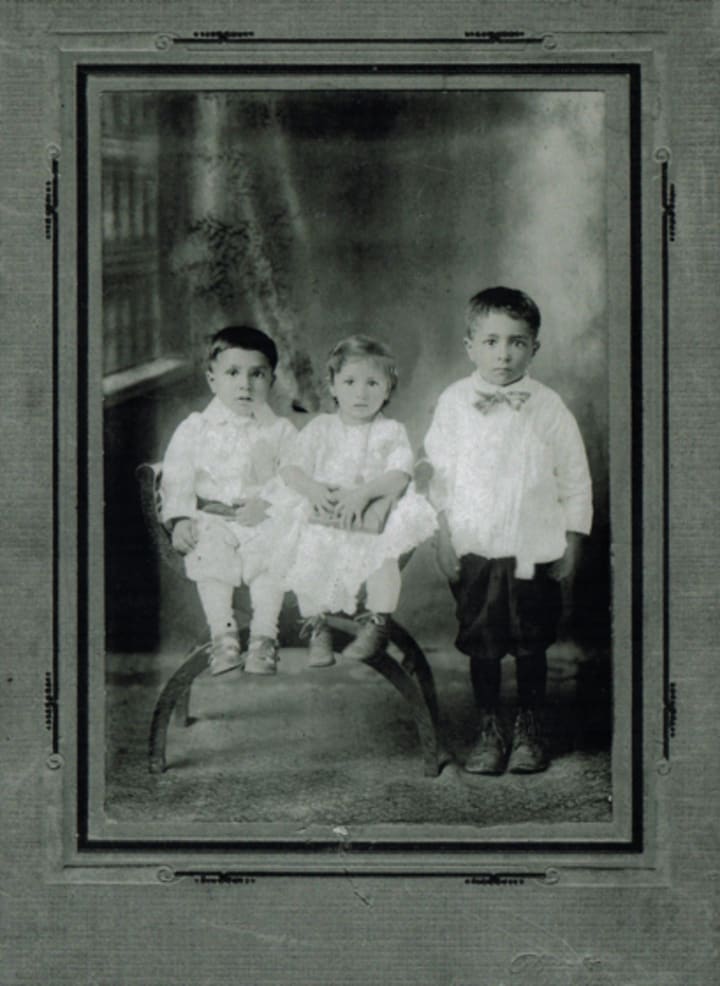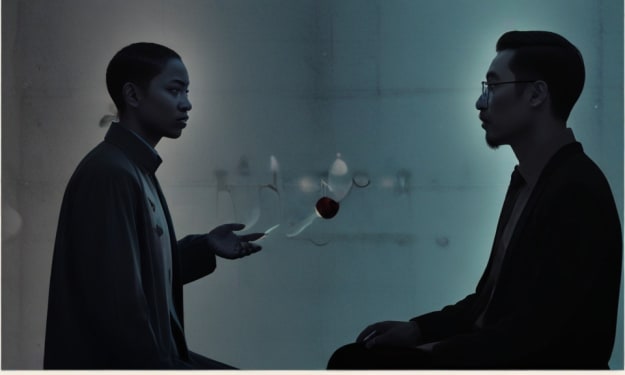The Wall That Loved Rosie
If Walls Could Talk...

If walls could talk, each wall would be its own storybook, read by aged grandparents to eager ears that gather. This I know, because I am a wall. I share my memories from the soot filled earth now, but there are things you should know. Things that matter that should not be forgotten.
I was the East wall of the sanctuary, created of timber and smooth blue-white marble, with Saint Anthony as my stained glass centerpiece. She loved that window and she sat by it at every Mass from 1895 until 1908. She wore simple dresses in rich colors with wide ruffles that encircled her tiny shoulders. Hair the color of ravens wings swept up in shiny whale bone hair pins. Her soft olive complected cheeks always bore the blush of sweet youth, and her lips were full and red as she sang the hymns in Portuguese in a town that mostly spoke English. She came alone for the first year and she would come early some Sunday mornings and stand with her face to the stained glass, a tentative fingertip tracing the lines of lead while she whispered her prayers with dark umber eyes half closed.
In the spring of 1896 she appeared with a young man her age and he was with her every Sunday thereafter. I watched them fall in love over that sweltering summer; casting sideways glances, whispering in their shared native tongue, arms pressed closely while they knelt to pray. When she peered at Saint Anthony now, there was a new light in her beautiful eyes. Rosie. That was her name. And his was Manuel. They were scarcely more than teenagers. Full of life and love and eagerness for a future in this new world of theirs.
June 11, 1897 rests in my memory and clings to the cool dark earth beneath the feet of those who trod here now. It was Friday and the church was buzzing with activity. Old ladies placed vases of vibrant flowers all around the church, including Mrs. Florencio, who seemed happiest of all. Doors wide open, candles lighted, tall pointy flames dancing in the warm breeze. I could feel the gaiety of this day as it echoed from my incense drenched facade.
She was the most beautiful bride I had seen in all my 21 years. She moved in slow motion, her white lace dancing all about her in rose petal scented air. The sun shone through stained glass, painting her in a brilliant kaleidescope as she walked in tiny white slippers to join her groom at the alter. Her smile! That bright and playful smile as she gazed upon her betrothed. Even I could feel the love between them as their eyes met in a moment when his hand gently brushed her cheek. A cacophony of joy arose, that joined the songs of birds in the trees outside. Crinkled happy faces of a village in celebration. The clink of glasses. The quiet afterward. The peace.
If walls could smile...
Summer turned to autumn in the valley. The couple came every Sunday, her in a heavy woolen shawl and he in his Sunday best farm clothes and boots, sometimes with snow still clinging to the toes. The chilly air brought a fresh color to her cheeks and by late spring of 1898, of a Sunday when it was too warm for the shawl, I could see that there would soon be a little one joining the family. The way they looked at each other is difficult to express; something solely human. Something that brought a warmth to the chill of my marble sill.
In the most stifling days of summer, I knew her time was near as she came and pressed her back into my surface. While the priest spoke of sacrifice, travail, blessings and love, I heard her moan softly as she gently wrapped an arm around her swollen middle. Her hair fell from its clip just then, unfurling like dark clouds blown by the wind; and came to rest against St Anthony and the sill of the window; against me. Shiny, thick, dark with sun painted edges. Soft. This solitary moment.
If walls could reach out and gently touch...
Early August, 1898. I don’t recall the day, but I recall the christening of little Manuel. How his tiny dark curls lay against his fresh white christening gown. How he did not cry as the water ran over his head, but Rosie did. The Florencio’s stood by; Maria and John who had no children of their own in their advancing years and were so very honored and proud to be named godparents that day. Although they were well past forty years of age, they held that baby up and passed him back and forth as though they themselves had created him. And such a beautiful boy he was. And his mother. I see her standing by the carved stone baptismal font holding her infant son with motherly repose; there is a blur that turns that memory into the Madonna and child. The sun just so, like a halo.
People stare at walls as of there is nothing there; but everything is there. I saw the whole world as it came to me. Old ladies and tiny babies squinted at my surface and pondered great things. Hands still wet with holy water slid across my marble, leaving drops and rivulets and later, dried spots. I saw pink new babies carried in to the sanctuary and old men carried out in pine boxes. I heard the wails of grief and the laughter of children. I once had blood running down the bottom half of me from a farm injury whose bandage failed. I knew secrets and I kept them. And where the time went, I don’t know.
After the century turned and little Manuel was starting to walk around by himself, Rosie was once again with child. This one came on the first day of April and he was called “Frank Silva.” The elder Manuel spoke of building a bigger house right in town and Rosie looked at him with such devotion. Once again there was a christening and once again, the Florencios stood in as godparents. Little Manuel...they called him “Manny” ran up to me with his arms wide. He placed his face against my surface. His dark eyes contemplated me. The children always understood.
That day Rosie came to me and she placed her hand squarely on the feet of Saint Anthony, and then ever softly, traced the lines of my marble, the dark imperfections, and then bent to kiss them! She lingered there, with eyes beyond her years and a face beyond time.
If walls had arms...

On a sweltering August morning in 1904, Rosie came alone, wearing a dark dress and clutching a rosary. She knelt beside me and she quietly wept and prayed “ Eternal rest grant unto my beautiful sister, O Lord, and let perpetual light shine upon her. May she rest in peace. Amen.”
She knelt until the sun moved from one window to the next and then she stood and approached Saint Anthony. “Bless this child. And pray for me” she whispered as she lay a delicate hand over her womb, which kept her secret, as did I. Her hair had grown past her waist by now and was as thick as a horses mane, yet as fine as silk.
I measured time by the liturgical year. There was Advent and Christmas, all the beautiful decorations, pine boughs, ribbons, regal purple cloths and candles of radiant white. Excitement, expectation, festivity. A return to ordinary time afterward. But was time ever really ordinary? I watched a people who built and decorated; who created and fashioned, and then took it all apart until the next turn of the calendar. I learned that a thing is more difficult to dismantle than it is to build.
March 6, 1905. It was in the middle of Lent when her third son was born. This one, they called Anthony. As with the others, the Florencio’s were there, as well as what seemed like half the village; on the day of Anthony’s christening. This boy was a bit lighter in color than the others, with dark honey colored hair and fine features, not unlike his mother. A prouder father I had not seen than Manuel, wearing a fine grey duster, his black hair combed back. Work beaten hands were folded just so, in a state of prayer, over his third son, tiny feet sticking out of the christening gown, thrice used.
I saw her bend to one knee as she wrapped an arm around each son and kissed their foreheads. Her hair was pulled up, but tendrils fell around her bodice and the little boys touched it with curious fingers, then ran off to play. She took the new baby into her arms and kissed his forehead also. Then she brought him to me. She tipped him up just so...I like to think she was showing him to me and in a sense, she was. “This” she said in her sotto voice “Is Saint Anthony. He is Portuguese, like you my son. You grow up....” she paused....”You grow up to be stubborn, but loving. To care for animals. To strive to be a saint for your mama!” She was filled with light and love and I beheld the soft indent of her dimples as she gazed upon her newborn…who they would come to call Antony.
Lent passed and Easter came. Rosie’s new house was built, the priest left and a new one took his place. A heavy snow came and a tree fell and broke the window in the West wall, and it was slowly fixed by the Cordoza boys and the Neves, but it never looked quite the same again. And the boys grew into handsome young replicas of their proud parents.

The winter of 1908 came in hard. I don’t know when I knew, but I think I was the first to know. Her cheeks had lost their pale-wine colored blush. She was quieter, troubled. Manuel didn’t notice, but then Manuel was not a sentinel, as was I. Manuel had many distractions, and I had but one. I recall every move, every gesture. Pressing her babies against herself more deliberately; letting her eyes linger on the cross longer. Praying more on odd days, as the weeks turned into months. By summer, everyone knew that Rosie was not well. What can I say of this? That I watched while she faded, Sunday by Sunday...that I remember the day she leaned into me, not in the travail of birth but in the heartbreak of bodily weakness. Yet she was no less beautiful.
On Saturday of the 27th week in ordinary time, on a crisp autumn morning in the oak framed bed she had birthed three children in, Rosie was taken away. I watched the procession that followed, young and old in black, silence and weeping. Flowers of orange and burgundy. Three little boys with sad dark eyes, The silvery pinewood box she was carried in; light as a feather. The rites, the prayers and the passage of time no longer ordinary. I broke that day. A crack that never healed.
If walls could weep...

They took her far from me, to the cemetery on the hillside. But you may ask, how do I know that? My world was in that sanctuary. And that is true, until the stone was chosen for her grave. Only the best, from a local quarry. The finest marble, of the purest bluish white, with wispy grey imperfections here and there. Ones that matched mine. For her stone was cut from the same as I. We became one... for eternity.

About the Creator
Tammy Castleman
I have been an avid writer and photographer for most of my life. In terms of true passions, those are mine. What I lack for in memory, I make up for in recorded detail. We are what we leave behind.






Comments
There are no comments for this story
Be the first to respond and start the conversation.